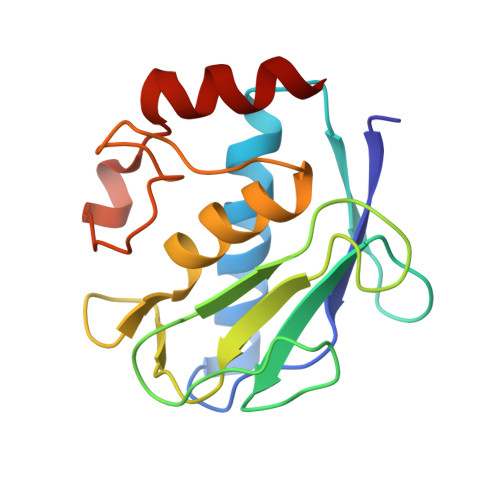Molecular determinants of a selective matrix metalloprotease-12 inhibitor: insights from crystallography and thermodynamic studies.
Czarny, B., Stura, E.A., Devel, L., Vera, L., Cassar-Lajeunesse, E., Beau, F., Calderone, V., Fragai, M., Luchinat, C., Dive, V.(2013) J Med Chem 56: 1149-1159
- PubMed: 23343195
- DOI: https://doi.org/10.1021/jm301574d
- Primary Citation of Related Structures:
4GQL, 4GR0, 4GR3, 4GR8 - PubMed Abstract:
The molecular determinants responsible for the potency of the RXP470.1 phosphinic peptide inhibitor toward matrix metalloprotease-12 (MMP-12) remain elusive. To address this issue, structure-activity study, X-ray crystallography, and isothermal titration calorimetry (ITC) experiments were performed. The crystal structure of MMP-12/inhibitor complex (1.15 Å) reveals that the inhibitor establishes multiple interactions with the MMP-12 active site, with its long P(1)' side chain filling most of the S(1)' deep cavity. ITC experiments indicate that the binding of this inhibitor to MMP-12 is mostly entropy driven (ΔG° = -13.1 kcal/mol, ΔH° = -2.53 kcal/mol, and -TΔS° = -10.60 kcal/mol) and involves a proton uptake from the buffer. Comparing phosphinic versus hydroxamate inhibitors reveals that the chelation of the zinc ion is slightly different, leading the inhibitor backbone to adopt a position in which the hydrogen bonding with the MMP-12 active site is less favorable in phosphinic inhibitor while maintaining high affinity.
Organizational Affiliation:
CEA, Service d'Ingénierie Moléculaire des Protéines (SIMOPRO), Gif/Yvette 91191 Cedex, France.


















